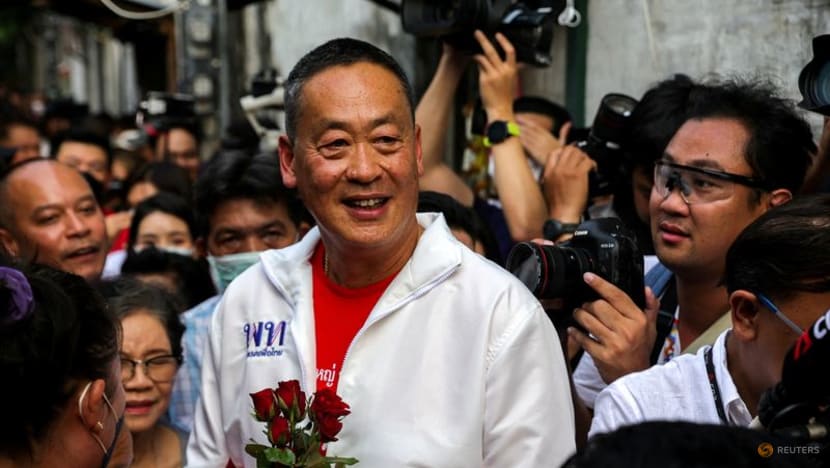Commentary: Who is really in charge in Thailand?
In theory, Thai Prime Minister Srettha Thavisin leads the country. But there is more than meets the eye, says this ISEAS-Yusof Ishak Institute researcher.


This audio is generated by an AI tool.
SINGAPORE: How many prime ministers does Thailand have now? One if you ask Srettha Thavisin.
In theory, the 62-year-old real estate tycoon is the prime minister of Thailand. Nominally, he leads a government coalition of 11 parties with 314 Members of Parliament (MPs) in the 500-member House of Representatives. But whether he is actually fully or partially in charge is another matter altogether.
In practice, Srettha is neither an MP nor the leader of Pheu Thai, the chief party in the ruling coalition. He has confessed to knowing a few of the party’s 141 MPs. His familiarity with MPs from other government parties is almost non-existent.
During the few hectic weeks prior to the formation of his Cabinet, Srettha was hardly at the bargaining table. He did not do the wheeling and dealing; rather, this was done by Pheu Thai bigwigs, notably Phumtham Wechayachai, who is now a deputy prime minister and minister of commerce; and Dr Prommin Lertsuridej, now the secretary-general to the prime minister. Both Phumtham and Dr Prommin have close ties to former prime minister Thaksin Shinawatra.
Undoubtedly, Phumtham and Dr Prommin consulted and listened to Thaksin, even though the 75-year-old former prime minister is officially a criminal convict serving a one-year jail term for corruption. Thaksin is widely regarded as the actual “owner” of the Pheu Thai.
In October 2023, Thaksin’s youngest daughter, Paetongtarn, was elected unopposed as the new Pheu Thai leader, even though the 36-year-old mother-of-two is a political greenhorn who has never been an MP.
One widespread rumour is about the imminent rise of Paetongtarn to join the Cabinet before Songkran (the Water Festival on Apr 13). Another rumour is that Srettha, who is concurrently the finance minister, will give up the finance portfolio because he has no time to handle it properly.
SRETTHA THAVISIN’S POLITICAL BET ON DIGITAL HANDOUTS
Srettha has been at odds with the Governor of the Bank of Thailand, Sethaput Suthiwartnarueput, over the actual condition of the economy. Srettha insists that the Thai economy has been in a “crisis” and therefore needs urgent stimulation of the “Digital Wallet” – a handout of 10,000 baht (US$279) in digital credits to every low-income Thai aged 16 and older. But Sethaput disagrees; he believes the Thai economy is recovering, and what is really needed is more investments to create jobs and increase exports.
Srettha has practically bet his political future on the successful launch of the Digital Wallet programme, which requires about 500 billion baht (US$14 billion). He has considered off-budget extraordinary borrowing. But the National Anti-Corruption Commission and the State Council Office have cautioned against rushing to the House with such a questionable bill, for fear of violating existing laws on fiscal discipline.
The latest official figures show that the Thai economy grew by 1.9 per cent in 2023, with 1.7 per cent growth in the fourth quarter, a slight improvement from 1.4 per cent in the third quarter. In other words, the Thai economy is not in a “crisis” as yet.
Therefore, there is no legal justification for the urgent borrowing to stimulate consumption spending. Resorting to such extraordinary borrowing is also not in line with Pheu Thai’s May 2023 election campaign promise not to borrow new public money to fund the Digital Wallet scheme.
Should the Digital Wallet fail to materialise, Srettha will be held responsible. At any rate, it has been argued on the ISEAS-Yusof Ishak Institute’s Fulcrum previously that the proposed scheme was never intended to stimulate the economy but serves as a “political tool” to revive Pheu Thai’s image and secure the Thai prime minister’s popular standing.
THAKSIN SHINAWATRA’S EARLY RELEASE STIRS THINGS UP
Srettha’s fate cannot be discussed without discussing the fate of Thaksin. On Feb 18, Thaksin was released on parole after 180 days in the Police Hospital, undergoing undisclosed treatments in a premium suite off limits to all outsiders. He is now serving the rest of his one-year jail term at home.
Thaksin’s first foreign VIP guest was none other than Cambodia’s former prime minister Hun Sen, who dropped by on Feb 21 for a quick lunch with Thaksin. The Cambodian strongman left after lunch without calling on Prime Minister Srettha. Apparently, Hun Sen knows who to talk to in Thailand to get what he wants.
Hun Sen, in his capacity as the chairman of the Cambodian People’s Party, invited Paetongtarn, leader of Pheu Thai, to visit Cambodia in March. Paetongtarn has accepted the invitation and is scheduled to lead a Pheu Thai team to meet Hun Sen in Phnom Penh from Mar 18 to Mar 19.
Nevertheless, Thaksin is not out of the woods yet. He is still facing two criminal charges of insulting the previous monarch, King Bhumibol, in his media interview in Seoul on May 21, 2015.
In addition to violating the lese-majeste law under Section 112 of the Criminal Code, which carries a jail term ranging from three to 15 years, Thaksin has also been accused of violating the Computer Law of 2007 for causing fake news to circulate in the social media from his interview in Seoul. The maximum penalties in this law include a jail term of up to 20 years.
On Feb 19, Thaksin denied any wrongdoing when he met a senior prosecutor to discuss the case. A new decision on how to proceed with the case against Thaksin will be made by the Attorney-General, and it is scheduled to be announced on Apr 10.
In late 2015, a different Attorney-General put on record his official view that the case should be prosecuted. This was pending the arrest of Thaksin who was then in exile, living mostly in Dubai.
This is not the first time Thaksin has been accused of violating the lese-majeste law. Several similar cases against him had all been dismissed owing to lack of evidence.
If the case against him is dropped like before, Thaksin can start counting the days until he legally regains his freedom in the third week of August.
In the meantime, Thaksin will be quite busy receiving visitors lobbying for better positions in a new Cabinet lineup. Thai politicians know who is actually in charge.
Termsak Chalermpalanupap is a Visiting Senior Fellow and Acting Coordinator of the Thailand Studies Programme, ISEAS – Yusof Ishak Institute. This commentary first appeared on the ISEAS-Yusof Ishak Institute's blog, Fulcrum.


















